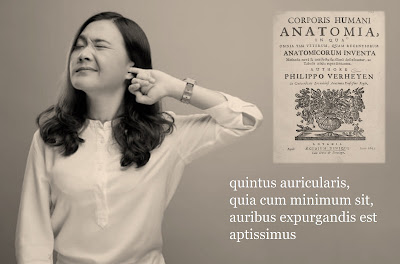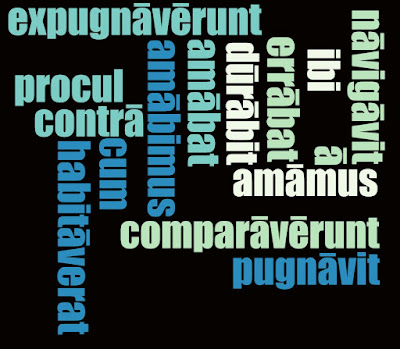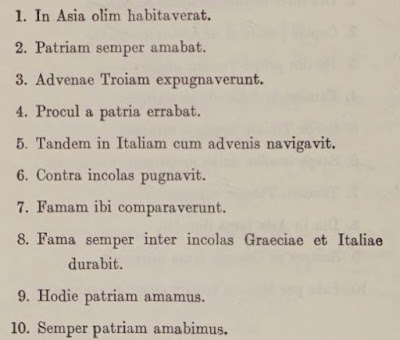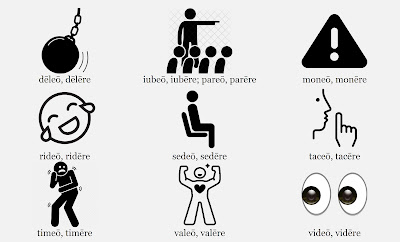Translate into English:
Ineunte vēre in Aegyptum advolant volucrēs serpentēs. Ibidēs autem avēs illīs occurrentēs, aditū prohibent, necantque serpentēs. Ob hanc causam magnī aestimantur ībidēs ab Aegyptiīs. Speciēs autem ībidis tālis est; colōre nigrō avis est, pedibus gruis, rōstrō aduncō. Serpentum fōrma similis est fōrmae hydrārum. Ālās habent nōn pennātās, sed vespertīliōnis ālīs similēs.
Vocabulary
aditus, -ūs [4/m]:
approach
aduncus, -a, -um:
hooked, bent, curved
aestimō, -āre,
-āvī, -ātus [1]: value, rate, consider, judge
āla, -ae [1/f]:
wing
grūs, gruis
[3m/f]: crane (species of bird)
hydra, -ae [1/f]: water-snake; in Greek
mythology, the hydra refers to a many-headed serpent and it is the second
labour of Hercules to kill the Learnaean Hydra
https://en.wikipedia.org/wiki/Lernaean_Hydra
occurrō, -ere, occurrī
[3]: (+ dative): (go to) meet; resist, oppose
rostrum, -ī [2/m]:
beak
vespertīliō, vespertīliōnis
[3/m]: bat
volucer, volucris,
volucre: winged
Notes
[1] ablative
absolute: present active participle + noun
iniēns, ineuntis:
present active participle < ineō, inīre, inī(v)ī: [i] enter; [ii] (here)
begin / make a beginning
ineunte vēre
│ with spring beginning = at the beginning / commencement of spring
[2] ablative of
separation
The ablative is
used when x is “separated” from y, that separation being physical or
abstract, positive or negative. Some verbs use a preposition with this
construction and others do not or there is inconsistency in use of a
preposition. The focus, however, should be on recognising the idea of
separation which is already conveyed in the verbs themselves.
[i] hostēs ¦ [ii] fīnibus
prohibuērunt │ They kept [i] the enemy ¦ [ii] from (their) borders.
[i] praedōnēs ¦
[ii] ab īnsulā prohibuit │ He kept [i] the pirates ¦ [ii] from
the island.
[i] urbem ¦ [ii] ā
tyrannō līberāvērunt │ They freed
[i] the city ¦ [ii] from the tyrant.
[i] liberāmur ¦ mortis
[ii] mētū │ [i] We are freed [ii] from the fear of death.
There is more to
the ablative of separation than has been discussed here and it will be looked
again when all forms of the ablative are reviewed. However, this is enough to
explain the sentence from the text:
aditū
prohibent │ they prevent (their) approach i.e. they prevent (the birds) from
approaching
[3] dative usage
[i] with compound
verbs:
occurrō, -ere,
occurrī [3]: (+ dative): (go to) meet; resist, oppose
ibidēs autem avēs illīs [dative] occurrentēs … │ the ibises, however, going to meet / opposing them …
https://adckl.blogspot.com/2025/02/130425-level-3-verbs-with-dative-case-1.html
or
https://adckl2.blogspot.com/2025/02/level-3-verbs-with-dative-case-1.html
[ii] … fōrma similis
est fōrmae hydrārum │ the shape … is similar to the
shape of water-snakes
[4] genitive of
value
magnī
[genitive] aestimantur ībidēs │ the ibises are highly / greatly valued
The genitive case
can be used to convey value or worth, but in an indefinite rather than
an actual price. The extent of the “value” is expressed by an adjective in the
genitive case although, as the quotation from Catullus illustrates, it can
also be a noun
magnī aestimō sapientiam │I value his wisdom highly
suōs parvī
fēcit │ he considered his (own men) to be of little (value)
floccus, -ī [2/m]:
wisp / tuft of wool > Nōn ego tē floccī faciō; nē mē territēs (Plautus)
│ I don't care a straw for you; don't be bullying me.
Plūris aestimō beneficium quam iniūriam (Seneca) │
I reckon a benefit at a higher rate
than an injury.
Catullus:
Vivamus, mea
Lesbia, atque amemus, │ let us live, my Lesbia, and let us love
rumoresque senum
severiorum │ and the rumours of rather stern old men
omnes unius
aestimemus assis! │ let us value them all at one penny
____________________
At the
commencement of spring winged serpents fly to Egypt. But the ibis birds going
to meet / opposing them, prevent (their) approach, and kill the serpents. For
this reason they are highly valued by the Egyptians. The appearance of the ibis
is as follows; it is a bird of a black colour, with the claws of a crane, and a
curved beak. The shape of the snakes resembles the shape of water snakes. They do
not have feathered wings but similar to the wings of a bat.
































